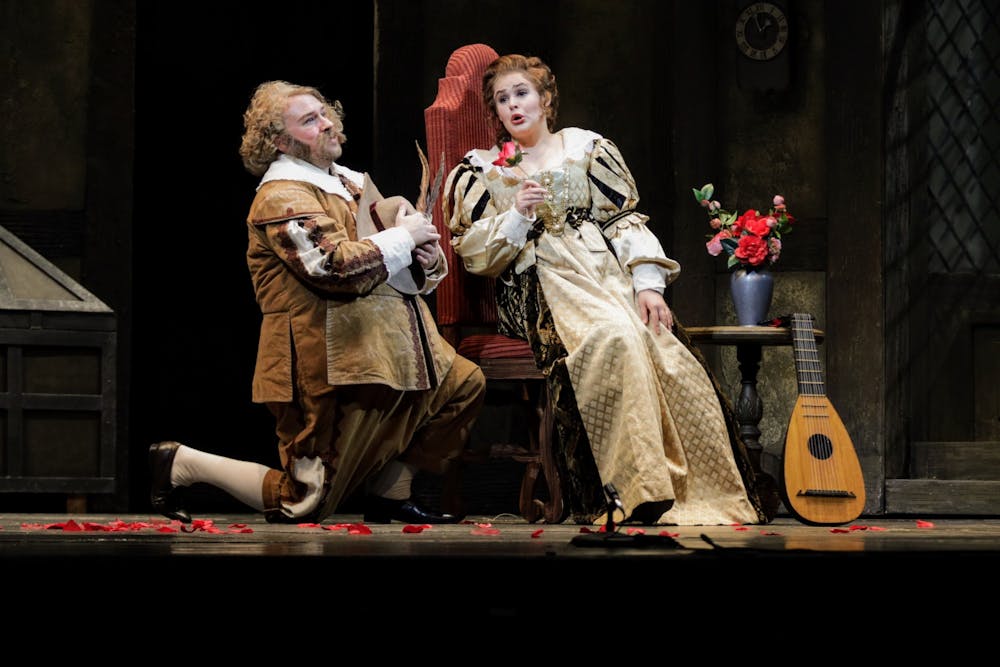As the lights dim and the curtain rises, two women exchange jokes in song from across the stage. One leaves, skirt brushing the floor as she walks. A man appears, winding his way drunkenly down a staircase with a flower in hand. As he curses the woman’s husband, above the stage, subtitles translate their Italian.
“Falstaff,” a comedic opera, will take place at 7:30 p.m. on Nov. 12-13 and 18-19 at the Musical Arts Center and will be livestreamed at 7:30 p.m. on Nov. 12-13 presented by the IU Jacobs School of Music.
The drunken man is the titular Sir John Falstaff himself, a once-revered knight now in need of money.
More: Eskenazi Museum to offer behind-the-scenes tour Nov. 12
To solve this problem, Falstaff devises a plot to seduce two married women and steal from them. When he sends the women — who are close friends — identical love letters, they create their own plan to make a fool out of him.
“As the multiple plots coincide, Falstaff is in the center of this ridiculousness and mixed communication,” director Michael Shell said.
Falstaff was composed by Giuseppe Verdi, an Italian composer, in 1893. The libretto, or text, was written by Arrigo Boito and is loosely based on Shakespeare’s “The Merry Wives of Windsor.”
It’s unlike other operas, Shell said, because of how quickly it moves. The drama is continually unfolding, with little room for stillness.
While Verdi was not known for his comedies and wrote the opera late in his life, Falstaff was cutting-edge at the time it was written, said Shell, and the opera is now known as one of Verdi’s greatest masterpieces.
Jeremiah Sanders, who plays Falstaff in one of the opera’s two casts, agrees, calling it almost modern in the way the music advances the action.
“This is one of the operas that advanced the genre,” Sanders said. “The composer was able to, with the libretto and librettist, make the music and the drama so intricately twined.”
For Sanders and Shell alike, Falstaff’s character drives the story forward.
“He used to be a somebody in society,” Sanders said. “And he starts out scheming and really trying to hustle some people, but it becomes more about connection.”
To Sanders, Falstaff is a character fighting to stay relevant while his life moves past him. While he’s often the butt of the joke, it’s his journey that makes the story worthwhile.
Also: Kindness Commute Campaign initiates sustainable travel, food pantry donations
And that journey isn’t just a mental one. In IU’s production, Sanders, his cast counterpart Chauncey Blade, and the production’s stage manager made Falstaff’s role very physical in how he moves and acts throughout the story.
“It’s kind of like running a marathon,” Sanders said. “That type of physical pacing to make sure you make it to the finish line, it’s something I’m still trying to balance.”
Mary Martin, a doctorate student in Jacobs, plays Alice Ford, one of the two women pursued by Falstaff.
She’s been involved in productions of “Falstaff” before, but she said the rehearsal process still comes with a lot of pressure. Because the show is not in English and is “through-composed,” meaning each stanza is different, she has to learn and pronounce many different words in Italian.
To Martin, Alice Ford’s character is empowered for the era in which she was written. Verdi gives the female characters in “Falstaff” agency, she said.
“Verdi uses this time to give women some power, which is very refreshing,” Martin said. “We’re holding the puppet strings, and we’re working through the action and controlling the plot and causing the chaos that ensues.”
The opera is a comedy, and Alice Ford has the last laugh in the show as she fools Falstaff.
“I think a lot of people associate opera with sad,” Martin said. “Audiences sometimes aren’t aware that opera can be funny. Opera can be a moment to have a fun experience that takes you away from reality.”




